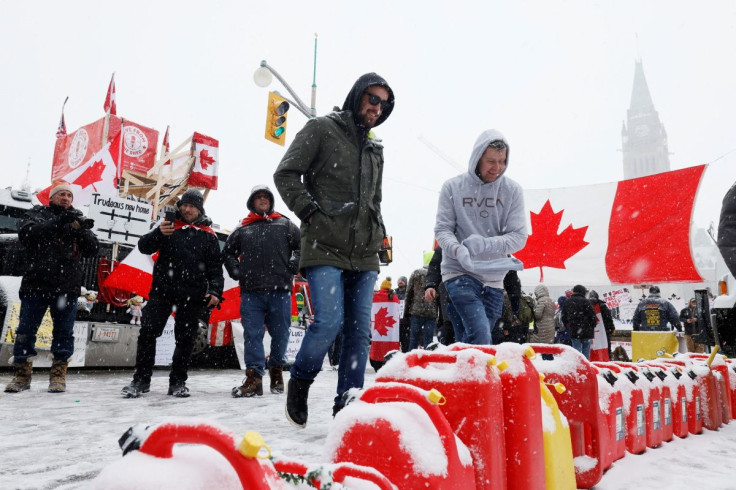Key Bridge To U.S. Remains Closed As Canada Police Clear Protesters

Canadian police cleared protesters and vehicles that had blocked a vital trade route on the border with the United States, making some arrests, but the bridge was not yet open to traffic on Sunday.
The officers moved in after a tense standoff between Canadian police and demonstrators since Friday when a court order and threats of arrest failed to end the blockade of the Ambassador Bridge in Windsor, Ontario, which entered its sixth day on Sunday.
"Enforcement actions continue at the demonstration area with arrests being made. Vehicles being towed. Please continue avoiding the area," Windsor Police said in a Twitter post early on Sunday, without saying how many had been arrested.
Police stepped up their presence with more than 50 vehicles, including cruisers, buses and an armoured car on Sunday, as the number of protesters dropped to around 45 from roughly 100 on Saturday. Windsor Police tweeted "there will be zero tolerance for illegal activity".
U.S. President Joe Biden has asked Canadian Prime Minister Justin Trudeau to use federal powers to end the blockade of the bridge, North America's busiest land border crossing. Since Monday, protesters in trucks, cars and vans have blocked traffic in both directions, choking the supply chain for Detroit's carmakers.
The bridge carries about $360 million a day in two-way cargoes - 25% of the value of all U.S.-Canada goods trade.
"It's our hope that it will be open today," Windsor City Mayor Drew Dilkens told CBC News, when asked about the reopening of the Ambassador Bridge. "Police are finishing off some activity that they are dealing with... we are also working on plan to sustain control of this roadway moving forward," he added.
The "Freedom Convoy" protests, started in the national capital Ottawa by Canadian truckers opposing a vaccinate-or-quarantine mandate for cross-border drivers, entered its 17th day on Sunday. But it has now morphed into a rallying point against broader COVID-19 curbs, carbon tax and other issues, with people joining in cars, pick-up trucks and farm vehicles.
Police moved in early on Saturday, pushing protesters back from the foot of the bridge, but more people streamed into the area in the afternoon and the operation appeared to have stalled.
Protests erupted across several cities in Canada on Saturday, with some 4,000 people in downtown Ottawa. Financial capital Toronto had some 1,000 demonstrators, though the police had shut key access roads to the central business district.
In the west, hundreds of protesters choked intersections along the Pacific Highway with vehicles leading to the Canada-U.S. border crossing in South Surrey, British Columbia. Several, camped out near the border crossing, vowed to stay "as long as is needed" until all COVID-19 restrictions are lifted.
Strangling bilateral trade, protests have spread to three border points, including in Alberta and Manitoba.
Canadian police have said the protests have been partly funded by U.S. supporters, and Ontario froze funds donated via one U.S. platform GiveSendGo on Thursday.
Ford Motor Co, the second-largest U.S. automaker, General Motors Co and Toyota Motor Corp all have announced production cuts. Companies have diverted cargo to stem losses during the cuts.
The estimated loss so far from the blockades to the auto industry alone could be as high as $850 million, based on IHS Markit's data, which puts the 2021 daily flow in vehicles and parts at $141.1 million a day.
"This is the busiest border crossing, so it's not just automotive," Dilkens said. "We are talking about things that impact the entire nation here. That's why finding a resolution is so important."
© Copyright Thomson Reuters {{Year}}. All rights reserved.





















